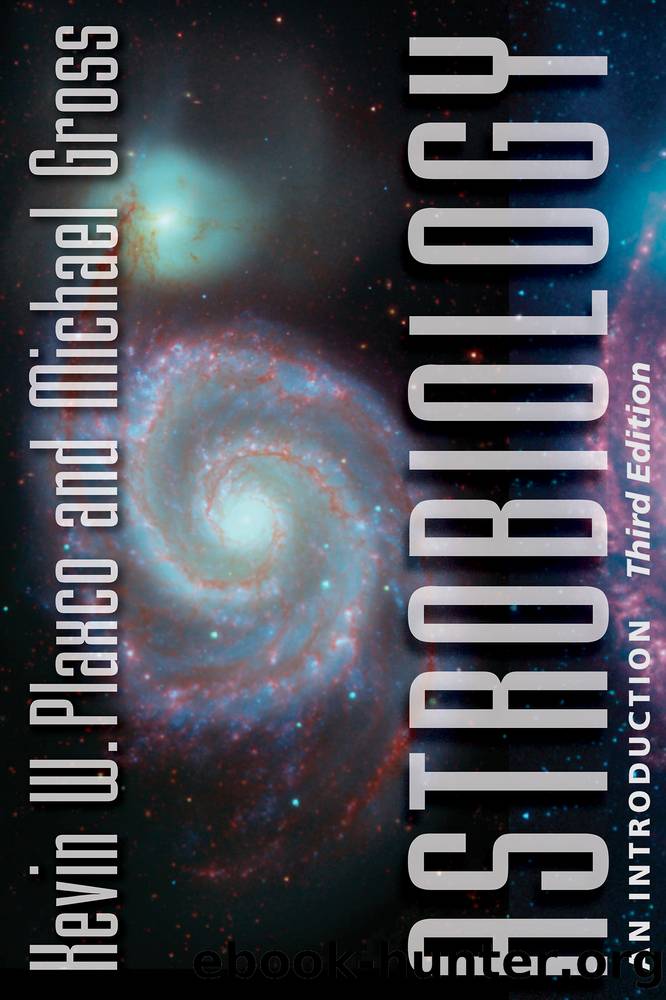Astrobiology: An Introduction by Kevin W. Plaxco & Michael Gross

Author:Kevin W. Plaxco & Michael Gross [Plaxco, Kevin W. & Gross, Michael]
Language: eng
Format: epub
Tags: science, Space Science, Astronomy, Life Sciences, Biochemistry, biology, Evolution, Physics, General
ISBN: 9781421441283
Google: jcYwEAAAQBAJ
Publisher: JHU Press
Published: 2021-08-03T23:57:50.365262+00:00
Which Came First, Proteins or DNA?
With the advent of a more durable genetic material and the availability of highly efficient protein-based catalysts, the machinery that copied, repaired, and transcribed the cellâs genome evolved to levels of complexity that were simply not possible in an RNA world. This complexity included not only enzymes that copy DNA to make either new DNA or RNA transcripts, but also enzymes that unwind DNA, repair DNA damaged induced by UV light or other sources of radiation, untangle DNA when itâs all knotted up, cut DNA at specific sites and that regulate the length of the chromosome ends, and much, much more.
But this raises a question. Because of the obvious advantages that proteins and DNA possess, it is easy to rationalize why the protein-DNA world took over from the RNA world. But even if we accept that the RNA world begat the protein-DNA world, which of these new polymers came first? As yet, nobody knows whether the RNA world first recruited proteins or recruited proteins only after inventing DNA. A rather indirect argument in favor of DNA first is as follows: while we know LUCA used DNA, LUCA may not have contained the enzyme ribonucleotide reductase, which converts ribonucleotides to deoxyribonucleotides, because this enzyme is quite different in archaea, bacteria, and eukaryotes. Steven Benner has speculated that this is because LUCAâs ribonucleotide reductase was still a ribozyme. That is, it was a ribozyme that catalyzed the reaction that made DNA, not a proteinâsupporting the argument that DNA came before proteins. Still, the ribonucleotide reductase reaction is a very difficult one to perform (it is one of the few biochemical reactions that relies on radicals), so there is some question as to whether it could have been performed by a ribozyme, and no such ribozyme has been created in the laboratory. Given this, it is probably best to say that the jury is still out on the question of which came first. Or, more accurately, second, after RNA.
Download
This site does not store any files on its server. We only index and link to content provided by other sites. Please contact the content providers to delete copyright contents if any and email us, we'll remove relevant links or contents immediately.
| Automotive | Engineering |
| Transportation |
Machine Learning at Scale with H2O by Gregory Keys | David Whiting(4292)
Never by Ken Follett(3937)
Urban Outlaw by Magnus Walker(3392)
OPNsense Beginner to Professional by Julio Cesar Bueno de Camargo(3283)
Sapiens and Homo Deus by Yuval Noah Harari(3063)
Will by Will Smith(2907)
A Short History of Nearly Everything by Bryson Bill(2689)
Hooked: A Dark, Contemporary Romance (Never After Series) by Emily McIntire(2547)
Rationality by Steven Pinker(2352)
Borders by unknow(2301)
The Becoming by Nora Roberts(2188)
Holy Bible (NIV) by Zondervan(2123)
A Short History of War by Jeremy Black(1842)
HBR's 10 Must Reads 2022 by Harvard Business Review(1839)
The One Percenter Encyclopedia by Bill Hayes(1825)
Freedom by Sonny Barger(1793)
Go Tell the Bees That I Am Gone by Diana Gabaldon(1748)
Five Ways to Fall by K.A. Tucker(1737)
Girls Auto Clinic Glove Box Guide by Patrice Banks(1724)
